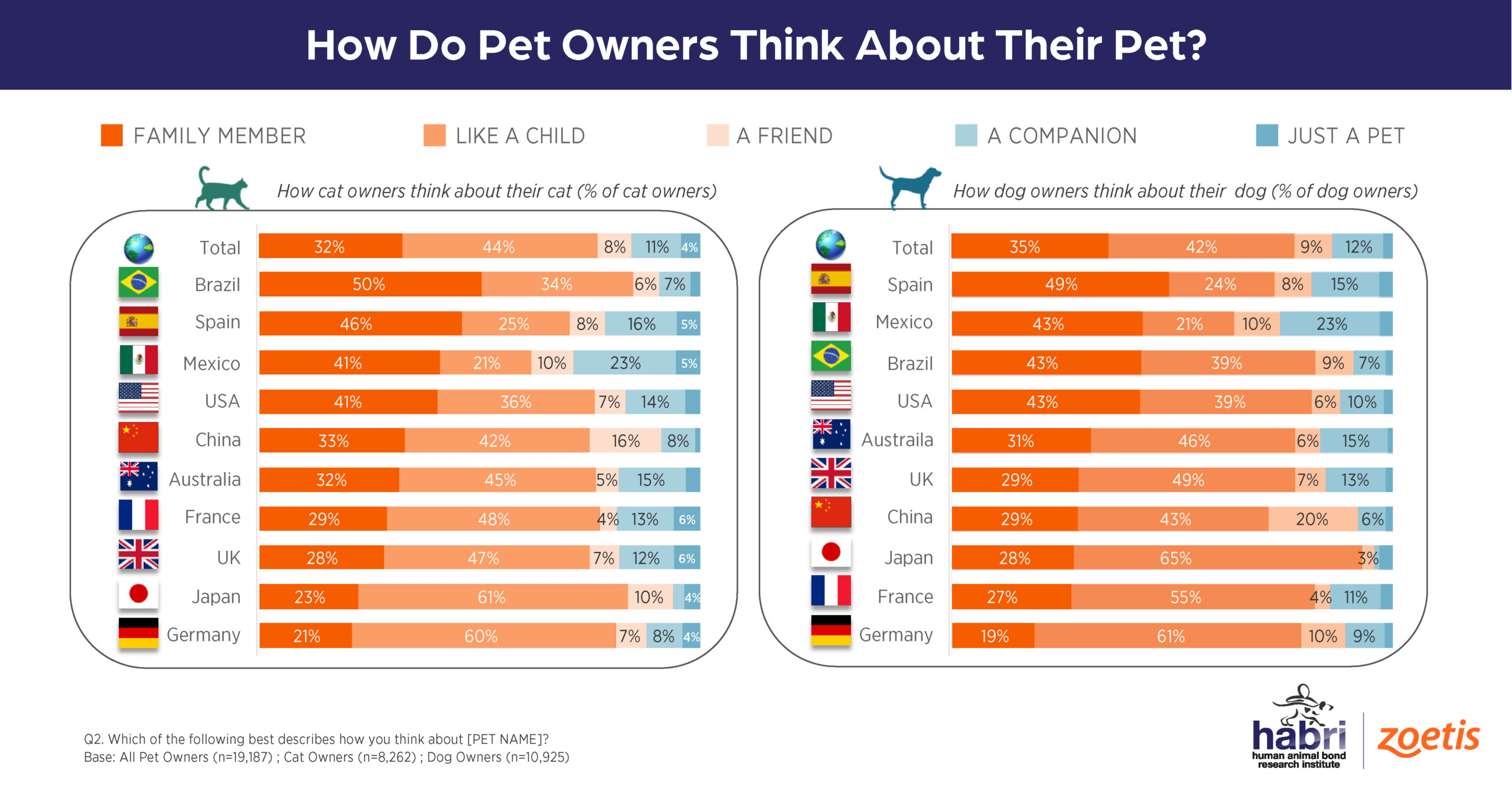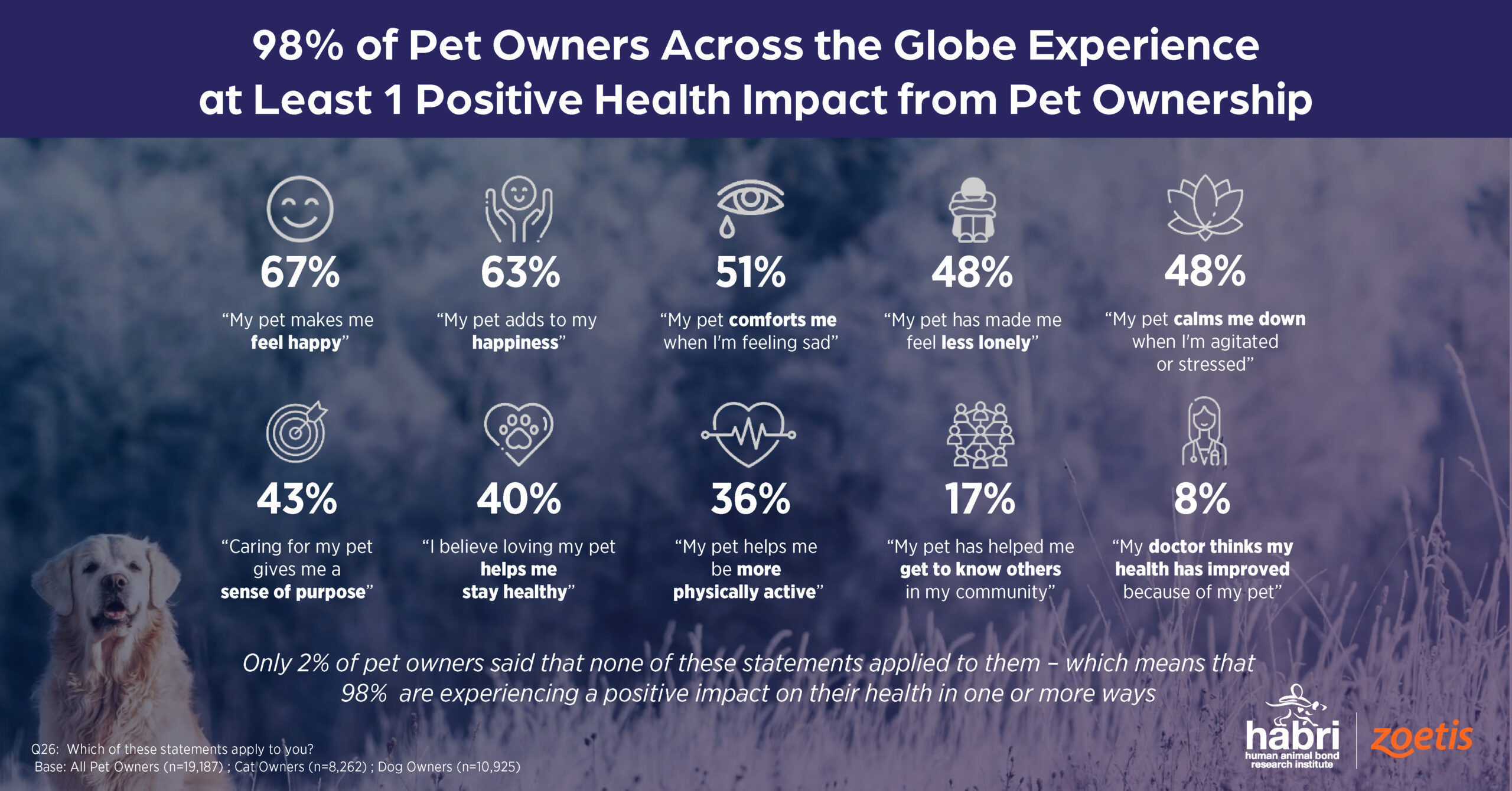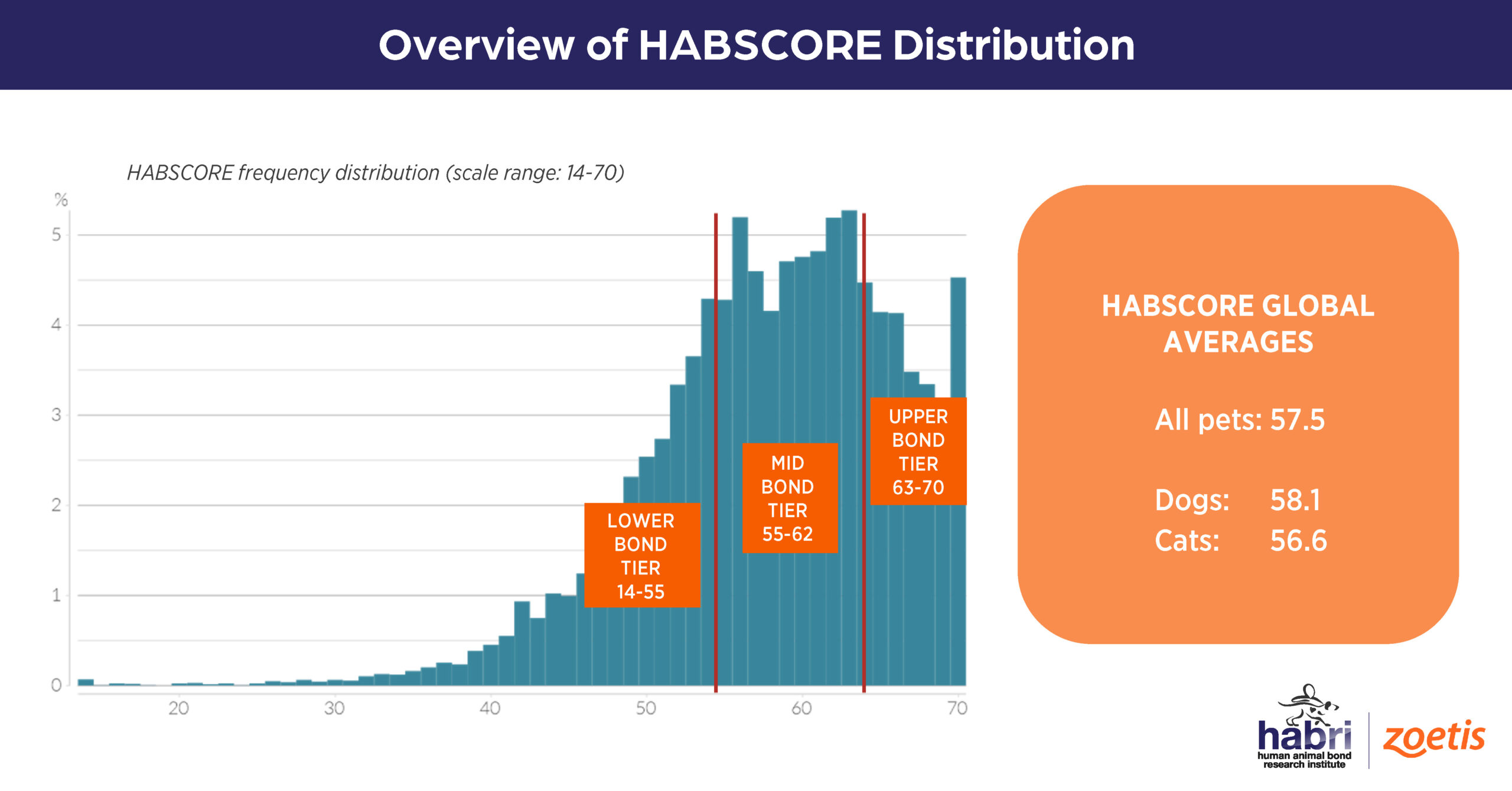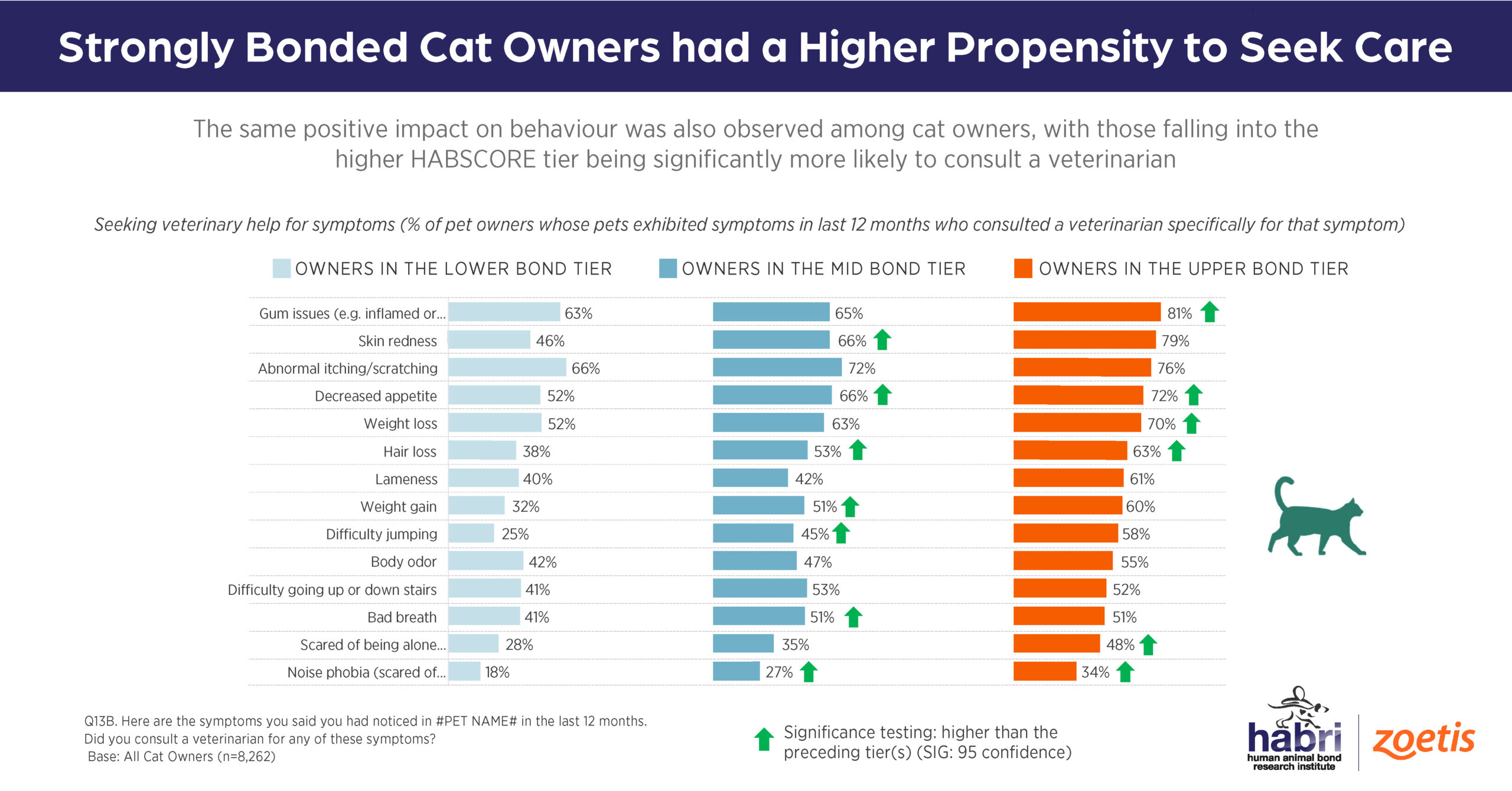The Human Animal Bond Research Institute (HABRI) in partnership with Zoetis commissioned a survey of 19,187 dog and cat owners and 1,512 small animal veterinarians from ten countries, including Australia, Brazil, China, France, Germany, Japan, Mexico, Spain, the United Kingdom, and the United States. This survey, conducted by CM Research Ltd., was tested at a confidence level of 95% (p ≤ 0.05).
HABRI and Zoetis commissioned this survey to gain a deeper understanding of how the human-animal bond is perceived and impacts behavior among pet owners and veterinarians worldwide. The research shows that the human-animal bond is strong, that pets positively impact their owners’ health, and that stronger bonds are connected to improved veterinary care around the globe.
Key findings from this survey are as follows:
The Human-Animal Bond is Universally Valued and Recognized Among Pet Owners
- 94% of pet owners globally consider their pet a part of their family
- 92% of pet owners globally say there’s no reason they would ever be convinced to give up their pet
- 89% of pet owners globally say they have a close relationship with their pet
- 87% of pet owners globally would pay whatever it takes if their pet needed extensive veterinary care
- 76% of pet owners globally say they would make major life changes for their pet, if necessary

There was no correlation in this survey between the strength of the human-animal bond and income.
Pet Ownership is Strongly Linked to Improved Human Health
- Virtually all pet owners around the world (98%) reported at least one benefit to their health from their pets including increased happiness, reduced loneliness, and decreased stress
- Specifically:
- 67% of pet owners say their pet makes them feel happy
- 51% say their pet comforts them when they feel sad
- 48% say their pet makes them feel less lonely
- 48% say their pet calms them when stressed
- 43% say their pet gives them a sense of purpose
- 36% say their pet helps them be more physically active
- 17% say their pet helps them know others in community
- Specifically:

- 89% of pet owners globally say they’ve experienced the mental health and/or physical health benefits of the human-animal bond
- Percentage of pet owners who say they’ve experienced benefits by country:
- Mexico: 96%
- Japan: 88%
- Germany: 93%
- Australia: 89%
- France: 87%
- UK: 84%
- China: 85%
- USA: 87%
- Brazil: 94%
- Spain: 81%
- Percentage of pet owners who say they’ve experienced benefits by country:
Stronger Human-Animal Bonds Improve Human Health & Animal Welfare
To more precisely measure the human-animal bond among pet owners, a new scale called the Human Animal Bond Score (HABSCORE) was developed that expands on previous scientifically validated scales. The HABSCORE examines the human-animal bond across four distinct dimensions: attachment, humanization, commitment, and integration.
The total average HABSCORE is high at 57.5/70.0, indicating the human-animal bond is strong globally. The survey found no strong cultural differences in terms of how the bond is experienced and expressed. The researchers divided respondents into three HABSCORE tiers – Low (Less than 55), Mid (55-62), High (63 or more) – to look at how the relative strength of the bond can impact human and animal health.

- Highly bonded pet owners are significantly more likely to report that their pet benefits their health when compared to pet owners in the lower third of the HABSCORE Scale, including:
Among Dog Owners
-
- My pet helps me be more physically active (60%, +28%)
- My pet calms me when I feel agitated or stressed (56%, +26%)
- My pet makes me feel less lonely (57%, +21%)
- My pet has helped me get to know my neighbors and others in the community (28%, +11%)
Among Cat Owners
-
- My pet helps me be more physically active (30%, +17%)
- My pet calms me when I feel agitated or stressed (63%, +28%)
- My pet makes me feel less lonely (59%, +21%)
- My pet has helped me get to know my neighbors and others in the community (15%, +7%)
The Human-Animal Bond: Veterinarians’ Perspective
Veterinarians believe in the importance of the human-animal bond for their practice and profession, according to the survey of 1,512 small animal veterinarians from ten countries, including Australia, Brazil, China, France, Germany, Japan, Mexico, Spain, the United Kingdom, and the United States.
Key findings include:
- 91% of veterinarians own a pet and over 9 in 10 say their pet has impacted them positively.
- 89% of veterinarians globally believe a strong human-animal bond increases pet welfare
- 78% of veterinarians globally credit the human-animal bond as the reason they entered (or joined) the profession.
- 79% of veterinarians globally are aware of the scientific evidence showing mutual health benefits from the human-animal bond
- 71% of veterinarians globally believe discussing the human-animal bond with their clients is valuable
- 42% of veterinarians globally talk to their clients about the science behind the human-animal bond
- 60% of veterinarians globally believe talking about the human-animal bond encourages clients to provide the best care for their pets
- 53% of veterinarians globally believe talking about the human-animal bond builds good relationships with their clients
Knowledge & Strength of Human-Animal Bonds Influence Pet Owner Behavior
This survey found a strong correlation between both the strength and knowledge of the human-animal bond and better veterinary care. Veterinarians, by communicating and championing the human-animal bond, are critical to the effort and to improving health for both people and companion animals.
When pet owners were asked about how greater knowledge of the human-animal bond would impact their behavior in the future:
- 80% of pet owners globally would be more likely to maintain their pet’s health, including regular check-ups with their veterinarian
- 59% of pet owners globally said they would spend more money on their pet’s care
- 73% of pet owners globally said it would encourage them to spend more time with their pet and provide higher-quality nutrition
- 37% of pet owners globally say they would purchase health insurance after learning more about the science of the human-animal bond
- 39% of pet owners globally say learning about human-animal bond science may encourage them to get another pet.
The stronger the bond, the higher number of annual vet visits pet owners tend to make, according to the survey. Global percentage of pet owners that visit the veterinarian two or more times per year:
- 71% – Higher Bond Tier
- 61% – Mid Bond Tier
- 48% – Lower Bond Tier
Highly bonded pet owners are significantly more likely to report that they provide their pet with preventive care, when compared to pet owners in the lower third of the HABSCORE Scale, including:
Among Dog Owners
- Flea/tick/worm preventatives (76%, +10%)
- Vaccinations (78%, +7%)
- Brushing Teeth (45%, +18%)
- Diagnostic screening (23%, +12%)

Among Cat Owners
- Flea/tick/worm preventatives (63%, +7%)
- Vaccinations (64%, +13%)
- Brushing Teeth (23%, +13%)
- Diagnostic screening (22%, +14%)

Highly-bonded pet owners are most likely to have consulted a veterinarian for specific symptoms experienced by their pet, when compared to pet owners in the lower third of the HABSCORE Scale, including:
Among Dog Owners
- Gum issues (81%, +15%)
- Abnormal itching (79%, +18%)
- Weight loss (66%, +13%)
- Decreased appetite (68%, +12%)
- Difficulty going up or down stairs (67%, +17%)

Among Cat Owners
- Gum issues (81%, +22%)
- Skin redness (79%, +33%)
- Decreased appetite (72%, +20%)
- Weight loss (70%, +18%)
- Hair loss (63%, +25%)

Additional Downloadable Materials
The following is a series of downloadable resources highlighting the results of the International Human-Animal Bond Survey.
To quantifiably measure the human-animal bond among pet owners on a global basis, researchers developed HABSCORE, a scale that builds upon scientifically-validated academic research.
The International Human-Animal Bond Survey Presentation provides an in=depth overview of HABRI and Zoetis’ global, quantitative study of 19,000 pet owners and 1,500 veterinarians across five continents and ten countries.
Shareable Graphics
Please feel free to share these graphics on your social media channels, websites, and blogs, and to share with your colleagues, friends and family.
- 98% of Pet Owners Have Experienced at Least 1 Positive Health Benefit of Pet Ownership
- HABSCORE Breakdown by Country
- How Pet Owners Think About Their Pet
- Overview of HABSCORE Distribution
- Strongly Bonded Cat Owners Do More Preventative Care
- Strongly Bonded Cat Owners Have Higher Propensity to Seek Care
- Strongly Bonded Dog Owners Do More Preventative Care
- Strongly Bonded Dog Owners Have Higher Propensity to Seek Care
- Strongly Bonded Pet Owners are Less Price Sensitive




